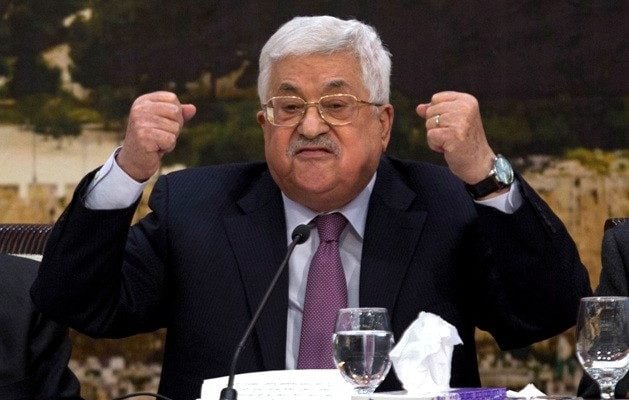The Palestinian leader called for “international talks to replace US mediation” before walking out of the UN Security Council session.
By: Steve Leibowitz, World Israel News
If there was a great divide between the positions of Israel and the Palestinians before yesterday’s meeting of the UN Security Council, it’s now grown to the size of the Grand Canyon. The heated session appeared to reinforce intractable divisions between the two sides with Palestinian leader Mahmoud Abbas accusing Israel of acting like “a state above the law,” while calling for an international peace conference under the sponsorship of the United Nations (UN), not the US.
Abbas stood up and left immediately after he concluded his by-invitation address. Ambassador Danny Danon fired back, calling Abbas a coward who was “part of the problem” rather than part of the solution. “Once again he is running away,” Danon said. “He put his demands on the table and he left, and he is expecting the UN to deliver the results. It’s not going to work that way. The only way to achieve results is to have direct negotiations.”
US Ambassador Nikki Haley challenged Abbas saying, “Our negotiators are sitting right behind me, ready to talk. But we will not chase after you. The choice is yours.” Haley was referring to the surprise presence of Jared Kushner, President Trump’s son-in-law and Middle East adviser, who sat with the American delegation in the Security Council chamber.
It was only Abbas’ second appearance before the Security Council, after a 2011 visit in which he advocated Palestinian statehood. In his remarks on Tuesday, he expressed an “absolute readiness to reach a historic peace agreement,” while totally rejecting US mediation. For his part, Israeli Ambassador Danny Danon, praised the Trump administration for “working very hard to make progress toward peace.”
Palestinians embrace Europe
Kushner and US Middle East Envoy Jason D. Greenblatt, remained after the public session of the UNSC, and took part in an hour long closed-door meeting. The briefing was reportedly short on details of the long anticipated US peace plan. The White House later issued a statement saying the administration was still working on its plan, “which is designed to benefit both the Israeli and Palestinian people. We will present it when it is done and the time is right,” the statement said.
Dan Diker from the Jerusalem Center for Public Affairs told World Israel News (WIN), “The PA is embracing Europe in light of the American recalibration of the Oslo principles that protect Israel’s vital interests. Until Trump, Abbas was able to chip away at Israel’s vital interests. Abbas is now behaving like an angry child. His statements reveal what many in Israel have said for a while. Now the United States negotiators are calling him out for his refusal to accept Israel as a nation state of the Jewish people. Abbas unmasked himself as a real obstacle to negotiations. He is trying to internationalize the conflict with a failed concept of bi-passing the US.”
Veteran Israeli diplomat Yoram Ettinger told WIN, “In order to assess the future of talks with Abbas one need only look at his track record of inciting the Palestinian youth. The only way to minimize radicalism is through bi-lateral negotiations like the peace agreements reached with Egypt and Jordan.”
“US policy has changed the way it looks at Judea and Samaria. This administration understands that the future of the territories can impact the future of Jordan and the future of Israel. They understand the negative impact on Israel if there was a Palestinian State on the mountain ridges of Judea and Samaria. I don’t know Trump’s final plan, but reality of the Middle East dramatically enhances strategic ties with Israel. If Israel were to withdraw to 1967 lines the strategic asset that is Israel of today becomes a strategic liability for the US and for all of its allies in the Middle East,” Ettinger said.




